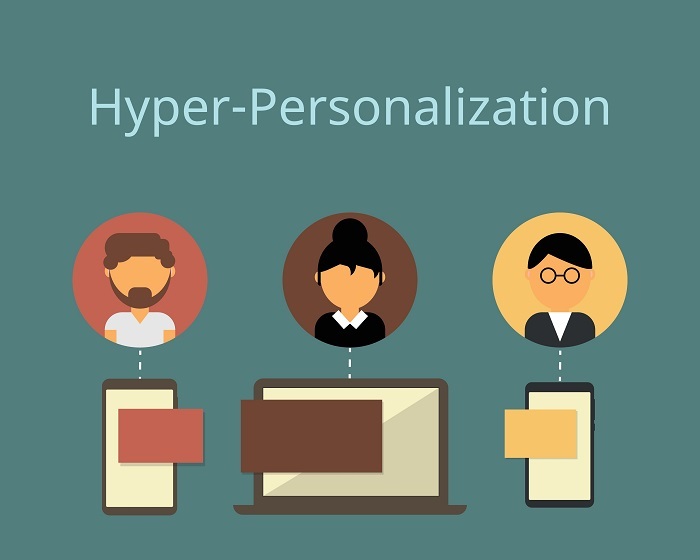
 Data Structure
Data Structure Networking
Networking RDBMS
RDBMS Operating System
Operating System Java
Java MS Excel
MS Excel iOS
iOS HTML
HTML CSS
CSS Android
Android Python
Python C Programming
C Programming C++
C++ C#
C# MongoDB
MongoDB MySQL
MySQL Javascript
Javascript PHP
PHP
- Selected Reading
- UPSC IAS Exams Notes
- Developer's Best Practices
- Questions and Answers
- Effective Resume Writing
- HR Interview Questions
- Computer Glossary
- Who is Who
The Power of Personalization: Using Data to Deliver Tailored Marketing Messages
When it comes to digital marketing, personalization is the process of adjusting marketing messages, information, and interactions to the unique requirements, objectives, opinions, and behaviors of different clients.

With each consumer, a customized experience is generated by gathering and examining data about their characteristics, viewing patterns, past purchases, use of social networking sites, and other pertinent factors. Through enhancing consumer connection, contentment, and commitment, personalization strives to improve consumer retention and, eventually, income for enterprises.
Digital advertising mediums such as email campaigns, webpages, social media advertisements, search engine optimization, and applications may all use personalization. Classification, targeted, and recommendation systems are methods for enhancing personalization.
Client information, data security, and ethical questions must all be carefully taken into account for personalization to be productive. Visitors must be given the choice to opt out of tailored marketing, and authorization must be obtained from them before any data is collected or used.
Power of Personalization

Since it allows companies to give their consumers a more meaningful, interesting, and quality experience, personalized is a potent weapon in digital marketing. The following are a few ways that personalization may help digital marketing ?
Improved client participation ? By making marketing communications more enticing and meaningful to targeted consumers, customizing may boost consumer engagement and provide a better overall experience for customers.
Increased conversion percentages ? Corporations may boost conversion rates and boost sales by customizing messaging and information to each individual customer's demands and preferences.
Increasing customer commitment ? By showcasing a company's understanding of its consumers' requirements and concern for their interests, customisation may help create deeper interactions with clients and increase loyalty and retention of clients.
Increased lifetime value for clients ? By providing a personalized service that satisfies consumers' requirements and preferences, organizations may raise the lifecycle value of those they serve, which leads to a boost in revenues over the duration.
Benefit over the competition ? As customization in digital marketing spreads, companies who don't provide a tailored product risk falling beyond their rivals and finding it difficult to differentiate in a popular market.
Therefore, customization is a crucial part of effective online advertising techniques and may aid companies in achieving their marketing goals by giving clients more compelling, pertinent, and lasting memories.
How to Use Data to Deliver Tailored Marketing Messages?
To deliver tailored marketing messages using data, businesses need to follow a few key steps ?
Gather and analyze consumer data ? Gathering and analyzing user information is the initial stage in distributing personalized brand messages. Data including surfing habits, past purchases, demographic characteristics, and many other necessary details can be incorporated into this. Organizations may learn more about the tastes, actions, and requirements of their customers by studying this information.
Segment your audience ? After examining your consumer data, categorize your client according to criteria like geography, age, hobbies, or past purchases. As a result, your promotional strategies will be more intriguing and pertinent to particular groups of your customers.
Develop tailored marketing communications ? By segmenting your customers, we can craft tailored marketing messages that respond to the wants and requirements of each category. You may, for instance, employ adaptive web pages that adjust based on a visitor's browsing activity to deliver highly targeted messages to consumers who have bought a branded service.
Implement automation ? To enhance the procedure more successfully, you may distribute customized marketing messages at volume using automation tools. With platforms for marketing automation, you may design sequences that respond to events like a new product, a lost cart, or a webpage presence to give consumers tailored messages.
Test and improve ? To guarantee that your marketing efforts are successful, analyze them, and improve your plan as time goes on. One can constantly enhance your brand awareness and convey more potent and compelling messages by looking at the outcomes of your efforts and modifying them in response to customer feedback.
In general, leveraging data to send personalized marketing communications is a potent approach to increase consumer loyalty, purchases, and interaction. You can build a more individualized and efficient commercial experience that promotes company development and financial success by comprehending your target and making a writing that caters to their specific needs and tastes.
The Negative Side of Personalization in Digital Marketing
Digital marketing may probably benefit from personalization, but there are additionally certain possible drawbacks that companies should have been aware of. There have been a few illustrations ?
Personal information ? As personalization frequently entails gathering and analyzing substantial volumes of client data, security, and information privacy issues may arise. Consumers could be reluctant to provide businesses with their private information when they're unsure of the manner in which that material is going to be applied or distributed.
Over-personalization ? Companies run the danger of over-personalizing their marketing communications, which might leave clients feeling as though their confidentiality is really being violated or feeling like they're being inundated with material. Customers may feel this negatively and become less engaged as a result.
Inaccuracy ? Personalized calls on precise client information, and if it's wrong or outdated, it might lead to marketing messages which are pointless or even insulting. Customers' connections and the name and reputation may suffer as a result.
Bias ? If customized algorithms are using inaccurate or biased data, this might unintentionally lead to bias in advertising messaging. For instance, a recommender that is educated on material that exhibits gender or ethnic prejudices may result in suggestions that support such biases.
Opt-out fatigue ? While companies must provide clients with the opportunity to decline targeted marketing, doing so can also lead to the phenomenon known as opt-out exhaustion, in which consumers are repeatedly contacted with demands to change their choices or disconnect from brand communication.
Ultimately, personalization may enhance digital marketing in many ways, but it's crucial for firms to be conscious of any possible drawbacks so they can take precautions to minimize their risks. Corporations may give their consumers a more satisfying and successful personalized marketing strategy because of being open and honest about their data methods, protecting patient confidentiality, and testing and improving personalization methods.

Conclusion
Marketing personalization has obvious power. Marketing is able to send personalized communications that are more useful and interesting by leveraging data to identify and approach the interests of certain customers. Benefit greatly, customer retention, and eventually, revenue, can all grow as a consequence of this strategy.
It's crucial to keep in mind, though, that personalization must always be carried out with integrity and competence. Marketing must make sure they have the necessary authorizations and permission from consumers to be using their knowledge, and they've got to be open and honest with regard to how this data is utilized. Nevertheless, personalization must never stray into weird or obtrusive areas.
In general, using data to send tailored marketing messages is a helpful tool in yesterday's online realm, but it needs to be handled carefully and with consideration for the confidentiality and choices of the recipients.

